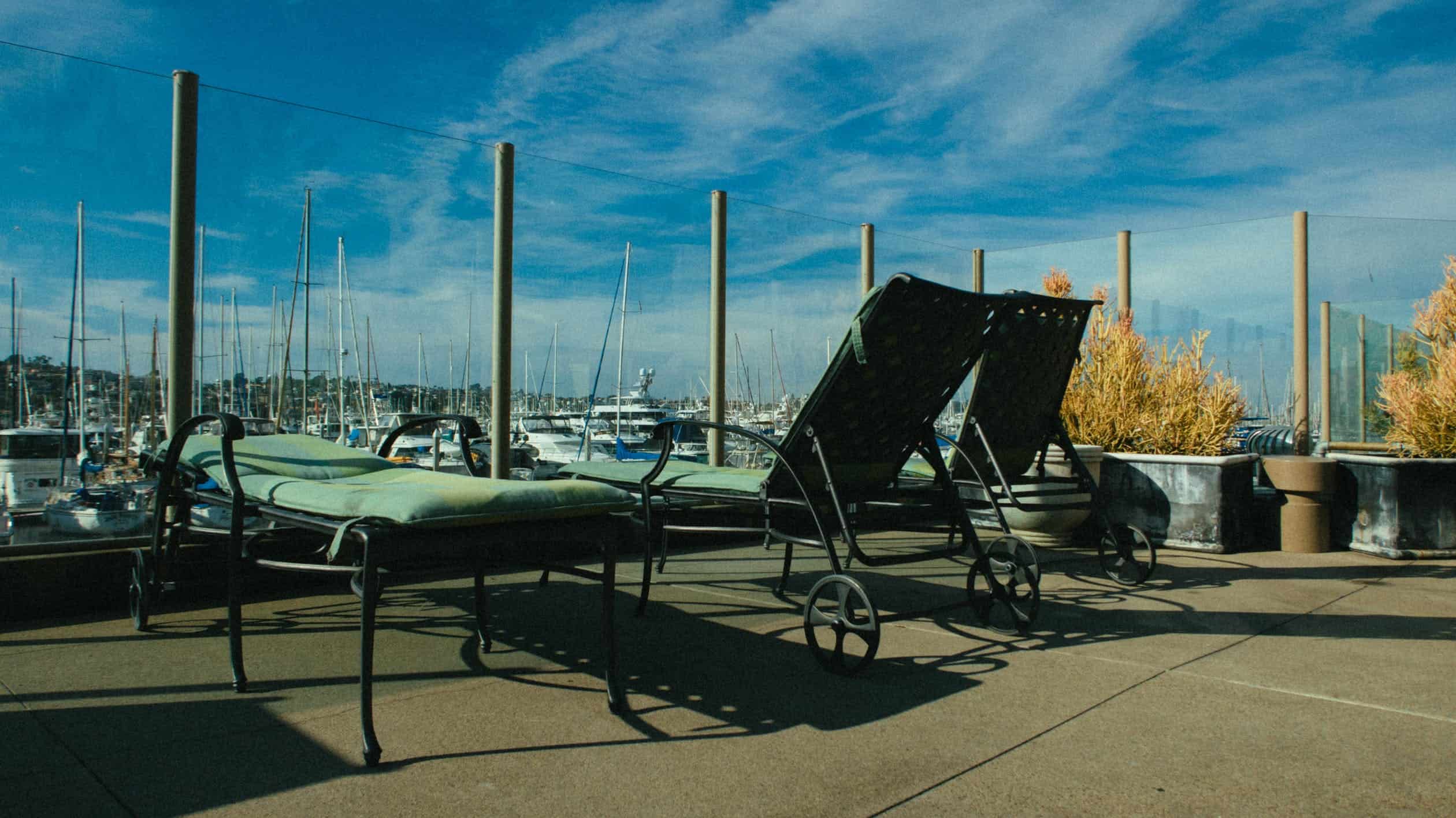Despite my nautical name, I, unfortunately, don’t live by the ocean. However, my wife’s family has a beach house near Nag’s Head and is kind enough to use it every year. It’s beautiful and has a picturesque back deck overlooking the dunes.
Naturally, when my in-laws were in the market for a set of new patio furniture, they called me up asking for advice. So, of course, since you’re here, you’re also wondering what things you need to know when shopping for patio furniture near the ocean. Well, break out the sunscreen and drink umbrellas.
By the end of this article, you’ll have everything you need to know to pick out the best patio furniture for salty air.
Best Materials
As I’m sure you’re aware, different patio furniture materials offer different strengths and weaknesses. Just because a patio furniture set will stand up to the extreme temperatures on the cold Alaskan permafrost, that doesn’t indicate that it will hold up to beach weather.
Let’s take a moment to evaluate the different materials suitable for patio furniture for salty air.
| Material | Suitability |
| Aluminum | Good |
| Stainless Steel | Great |
| Synthetic Resin | Great |
| Teak (and Acacia) | Great |
Now, let me explain why I chose these. First, let’s examine the type of conditions the patio furniture will be subjected to. Of course, since we’re buying this for salty air, we know a few other things too.
- The furniture will be subjected to high humidity.
- Rain / sea spray will be common.
- Hurricanes and other tropical storms are possible.
With those facts in mind, we know we’ll want to choose patio furniture that is rust-proof and heavy. The above materials meet these criteria to varying degrees. So let’s examine each one individually.
Aluminum
I ranked aluminum as only “good” for one reason. Although aluminum is rust-proof and would largely be unaffected by the salt air, it’s one of the lighter metals. While this is great for moving your patio furniture around, it’s terrible for high winds. You’ll need to take precautions to ensure that your furniture stays on the ground. If you have your heart set on aluminum, I’ve actually created a handy guide to help keep your patio furniture from blowing away.
Stainless Steel
Stainless steel is a solid choice in more ways than one. It’s typically rust-proof, although this can vary depending on the quality of the patio furniture. Unfortunately, it’s also heavy, meaning that it will probably take gale force winds to make it budge (cushions notwithstanding).
Synthetic Resin
Synthetic resin is surprisingly heavy and a fantastic choice for patio furniture near the ocean. Since these items are not constructed of metal, they’re definitely rust-resistant. However, a word of warning: cheaper sets often use screws / other hardware that isn’t rust-proof.
Teak (and Acacia)
Last but not least, teak is an amazing material for beach-side patio furniture. It’s also the only wood choice listed (along with its cousin, Acacia — although there are disadvantages). Heavy woods like Teak are the only kind that:
- Don’t require a tremendous amount of upkeep to keep from warping.
- Are heavy enough to stand up to the sea winds.
That being said, this material is generally the most expensive. However, if your wallet can take the hit, it’s an amazing construction material.
Worst Materials
You’ll absolutely want to avoid some materials when purchasing patio furniture for an ocean property. For one reason or another, these are absolutely awful for the conditions around a beach.
| Material | Suitability |
| Plastic | Poor |
| Soft Wood | Poor |
| Wrought Iron | Bad |
Likewise, let’s dive into why we ranked these three materials as the absolute worst. Generally, they go in the opposite direction of the traits we looked for above. Namely, they’ll blow away or corrode from the salty air.
Plastic
You can probably already see what’s coming: plastic is light. Although cheap, you’ll be buying a new set as soon as the first tropical storm hits the shore. That’s just the nature of plastic patio furniture, unfortunately. Unfortunately, there’s not much you can do about it.
Soft Wood
Softer wood is still typically heavy enough to stay on the ground, but it suffers from another problem. The humidity of the sea air can cause warping and swelling. Over time, this patio furniture will degrade and eventually become unusable!
Wrought Iron
Wrought iron seems like a good option on the surface. It’s heavy enough to stay put, and iron is an incredibly durable construction material. However, wrought iron patio furniture rusts quickly, even in drier climates! In addition, the humidity and salt from the ocean will completely eat wrought iron furniture alive.
Weatherproofing
If you’ve already purchased your furniture and it’s listed on our “worst” list, you can still try weatherproofing your investment. Although I can’t guarantee that your furniture will stand the test of time, you can likely buy it for a few extra years. So here are some simple care tips to keep your furniture protected against the salty air.
Apply Weather-Resistant Finish
Regardless of your patio furniture material, you can apply a weather-resistant to help protect your purchase against the salt air. These are typically aerosol sprays that only take 20-30 minutes to apply. After the initial application, you’ll be set all season.
Depending on what your furniture is made of, you’ll need to choose the appropriate sealant. Here’s a handy chart:
| Material | Type of Finish |
| Wood | Thompson’s WaterSeal |
| Wicker | MinWax Helmsman Spar Urethane |
| Metal | Rust-oleum Rusty Metal Primer |
Purchase Furniture Covers
You can also take the route my in-laws took and purchase patio furniture covers. This is a slightly more involved approach, but it can do wonders for prolonging your furniture’s lifespan.
The downsides? You’ll need to uncover the patio furniture whenever you’d like to use it (and cover it back up when you’re done). If you’re not the type of person who will do this diligently, you might want to pick another option. If you think you can keep up with it, I wrote an entire guide on when to cover your patio furniture.

